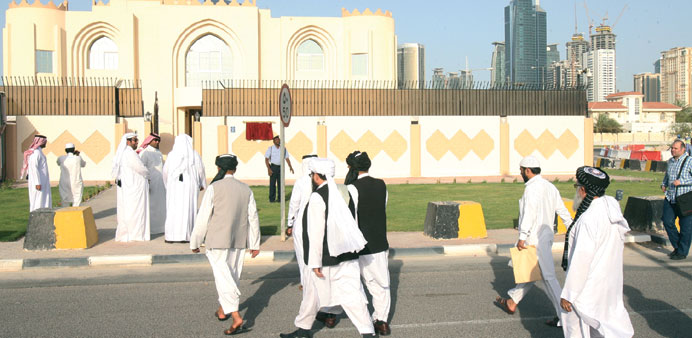The Afghan Taliban have rejected a power-sharing agreement in which they are supposed to control “some parts” of Afghanistan and termed such a formula as a “global conspiracy” to split the country.
“The Taliban will never let it happen,” sources within the movement told Gulf Times yesterday.
According to reports, Afghan President Hamid Karzai is expected to visit Pakistan tomorrow where he will meet top Pakistani civilian and military leadership to discuss how to work out a power sharing deal to end the strife in Afghanistan.
Taliban sources also denied any alleged “secret meeting” between their Doha office representatives and a “specially-flown high level delegation of Afghan government officials” recently (on the 26th of Ramadan), in which a formal proposal of the power-sharing formula was reportedly handed over to the Taliban on behalf of President Karzai before his scheduled meeting in Pakistan.
The Afghan government too officially denies that it has proposed any power-sharing formula to the Taliban.
In fact, a senior Taliban official said: “Our Doha office has been temporarily shut down and no representative is allowed to officially meet or talk with anyone unless we get the clearance from the top leadership (Mullah Omar).”
According to the reported power-sharing arrangement, the Taliban would control the southern parts of Afghanistan, while the US-backed and Karzai-supported government forces would control the northern areas.
Specifically, Kandahar, Zabul, Ghazni, Paktia, Paktika, Khoust, Nooristan and other south eastern parts of Afghanistan would be in Taliban control, while the Afghan capital Kabul, Herat, Shabarghan, Bagram and Laghman would be with other forces.
It was also suggested that such a power sharing arrangement would be tried and tested over three years with a temporary ceasefire arrangement. The US and Gulf countries would supposedly act as guarantors.
“If we agree to such an arrangement, it would mean that the Taliban is accepting to become part of the global conspiracy to split the country into small parts and make it weak forever. No Afghan can allow this to happen and the Taliban too will defy it at all costs,” a senior Taliban source told Gulf Times.
He recalled that even their movement’s leader, in his recent Eid message, had reiterated the Taliban stand that their main opposition was towards American “occupation” in Afghanistan and once that ended the Afghans themselves would work out how to run the government.
Taliban chief Mullah Omar had said in his Eid message that although he had rejected the upcoming Afghanistan 2014 general elections, he believed in reaching an understanding with the Afghans regarding an inclusive government based on Islamic principles.
“When the occupation ends, reaching an understanding with the Afghans will not be a hard task because, by adhering to and having common principles and culture, the Afghans understand each other better,” he had said.
The Taliban source also revealed that such a power-sharing formula was “nothing new” and in fact such ideas had been floated many times in the past during their back channel meetings with the US, Afghan and other stakeholders in Doha, Paris and elsewhere.
“We had rejected the proposal back then and we will continue to reject them,” the senior Taliban source reiterated.
Pakistan’s foreign office officially denies it backs any power-sharing arrangement between the Taliban and Karzai administration. But Reuters had quoted Afghan Deputy Foreign Minister Ershad Ahmadi last July as saying that Islamabad had floated a formula based on the idea between Kabul and the Taliban as part of the peace talks’ “end game” in a meeting Pakistani national security adviser Sartaj Aziz had with Afghan ambassador Umer Daudzai.

